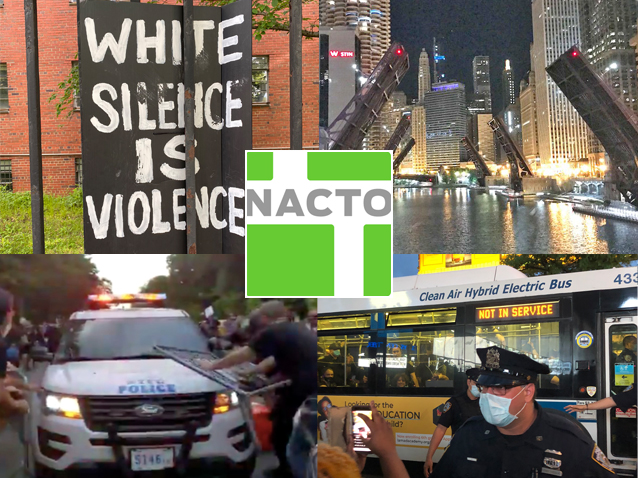The following statement was issued by the National Association of City Transportation Officials, a national organization comprised of 84 city transportation honchos. The group has long said that its primary mission is to build cities as places for people, with safe, sustainable, accessible, and equitable transportation choices that support a strong economy and vibrant quality of life, but the following statement carves out a far broader and far more meaningful view of that mission statement. We are reprinting it in full:
Over the past few days, people have taken to the streets in over 140 cities across America to protest the police killing of George Floyd, Breonna Taylor, and too many others, and to demand that, as a country, we uproot the unjust, racist power structure of the United States. The harassment and injustice that people of color, particularly Black people, experience at the hands of law enforcement on transit and in streets and public spaces is unacceptable and wrong. The police violence perpetrated against generally peaceful protesters exercising their First Amendment right of free speech is unacceptable and wrong. NACTO condemns racist violence and abuses of power. We stand in solidarity and commitment with the Black Lives Matter movement.
Racism, police violence, and structural inequity are transportation problems, and as transportation planners, engineers, policy- and decision-makers, we cannot turn a blind eye. Our job is to make streets and public spaces safe for everyone. But, from historic policies like redlining to modern ones like criminalization of fare evasion, many transportation and land use decisions have amplified and fortified racial inequities. If we ignore historical and current-day racism and pretend that the spaces we create are neutral, we abdicate our responsibility to provide safe mobility for everyone and we become complicit in perpetuating the racist underpinnings of our systems and structures.
Every day, the people in transportation agencies at every level of government are faced with decisions that mean the difference between sustained progress, or a continuation of violent oppression. For example, when we open streets to people but rely on police presence to enforce those spaces, we actively harm many of the people we are trying to support, opening up Black Americans in particular to another venue where they can be stopped by the police, and all too often, arrested, injured, or killed. When we shut transit systems in response to protests, we deny countless people, largely of color or lower incomes, a means of mobility and their right to voice their concerns and seek redress from their government. Transportation’s complicity in these unjust systems must stop.
For those of us in the transportation industry, especially those in leadership positions, this moment requires us to take special pause and self-reflection. Many of us entered this work because we wanted to correct the segregation and inequity of our regions; because we viewed cities as vehicles for justice, equality, and places where every person can find fulfillment and dignity. Despite these good intentions, many of us, particularly those of us who are white, have unintentionally perpetuated the racist structures that make our cities and regions inequitable.
We all hold power. It is past time for each of us to use that power to stamp out racism and injustice; past time to take an anti-racist approach to all transportation decision-making, from funding and project prioritization to engagement, implementation and enforcement practices, to hiring, contracting, and procurement. It is past time to have the hard conversations about how to limit law enforcement’s role in the management of public space. It is past time for each one of us to do the work, internally and externally, to truly be drivers of progress towards the values and goals we espouse.
As we work together on recovery from the disparate impacts of COVID-19, and grapple with our path forward in light of the past week’s violence in our streets, we must recognize that our efforts will be incomplete and insufficient without equal effort to dismantle racist systems. We must ensure that our work creates a more just future where freedom of mobility rings true for all.






